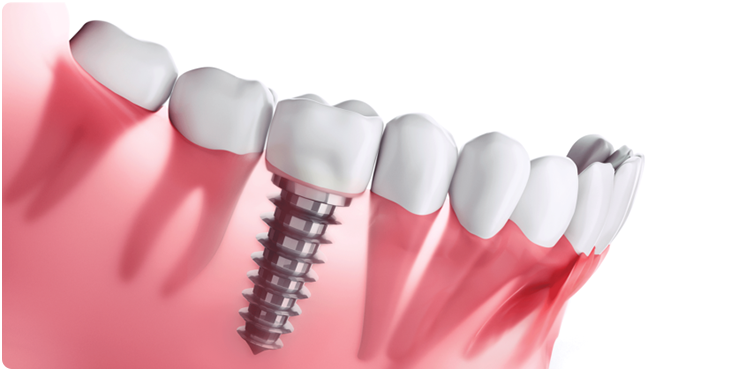Dental İmplantlar, eksik dişi yapay dişle değiştirmeye yardımcı olur, ancak doğal dişe benzer güçlü ve dayanıklıdır. Dental İmplant, eksik dişinizi değiştirmek için yapılan kozmetik bir işlemdir. Ameliyat, kuronlar, köprüler veya takma dişler gibi bir diş protezini desteklemek için çene kafataslarına bir taban / vida tertibatı takılmasını içerir. İmplanta ya diş protezine (diş, köprü ya da takma diş) takılmadan ya da diş protezini tutacak bir abutment yerleştirilmeden önce, osseointegrasyon için değişken miktarda iyileşme süresi gerekir.


Güçlü ve Dayanıklı Çiğneme Yeteneği

Konuşma Yeteneğinizi Geliştirir.

Kalite Güvencesi
Sözlü Danışma ve Tedavi Planlaması İlk konsültasyon sırasında diş hekimi, hastanın ihtiyacına uygun tedavi planlarını formüle etmek için çeşitli diş muayenelerine erişecektir.
İmplant yerleştirilmesi, bir diş ameliyatında steril koşullar altında gerçekleştirilebilen nispeten basit bir küçük cerrahi prosedürdür. Tedavi gerekirse lokal anestezi altında sedasyon ile yapılır. Değerlendirme sırasında, altta yatan kemik yetersiz görülürse, kemik rejenerasyonu için çeşitli seçenekler mevcuttur. Kemik rejenerasyonu, ihtiyaca bağlı olarak implant yerleştirme işleminden önce veya aynı anda gerçekleştirilir.
İmplantların hastanın kemiğiyle kaynaşması altı haftadan altı aya kadar sürebilir. Bu entegrasyon süresi boyunca geçici takma dişler veya köprü işleri uygun şekilde giyilebilir. Bazı durumlarda geçici dişler, implantlara 'anında yükleme' olarak bilinen bir sürece entegre olurken sabitlenebilir.
İmplant tedavisinin tamamlanmasının ardından, hasta yeni dişlerini (restorasyonları) dişhekimlerinin önerdiği şekilde düzenli ve iyice temizlemelidir. Bir diş sağlığı uzmanı ayrıca restorasyonların ve doğal dişlerin bakımı ve bakımı konusunda da tavsiyede bulunabilir. Diş hekiminize düzenli ziyaretler çok önemlidir, böylece yumuşak dokunun sağlığı, kemik seviyeleri ve restorasyonun bütünlüğü gözden geçirilebilir.
İmplant tedavisinin tamamlanmasının ardından, hasta yeni dişlerini (restorasyonları) dişhekimlerinin önerdiği şekilde düzenli ve iyice temizlemelidir. Bir diş sağlığı uzmanı ayrıca restorasyonların ve doğal dişlerin bakımı ve bakımı konusunda da tavsiyede bulunabilir. Diş hekiminize düzenli ziyaretler çok önemlidir, böylece yumuşak dokunun sağlığı, kemik seviyeleri ve restorasyonun bütünlüğü gözden geçirilebilir.